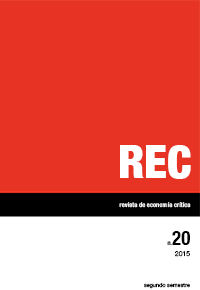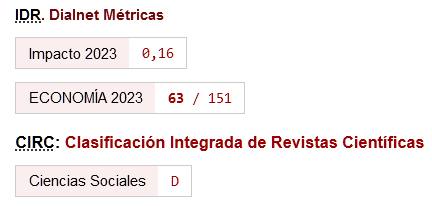La Ecología Política del Agua Virtual y Huella Hídrica. Reflexiones sobre la necesidad de un análisis crítico de los indicadores de flujos virtuales de agua en la economía
Palabras clave:
agua virtual, huella hídrica, economía ecológica, ecología políticaResumen
Desde la perspectiva de la economía ecológica, los indicadores físicos de consumo de agua como son el Agua Virtual (AV) y la Huella Hídrica (HH) pueden ser utilizados para visibilizar los conflictos ecológicos distributivos que provoca el metabolismo social de la economía. En este trabajo mostramos que aunque el AV y la HH visibilizan el "origen material- hídrico" de dicho conflictos, a la vez abstraen el recurso agua de su contexto material y en consecuencia, ignoran como afectan a la gestión de los recursos hídricos las relaciones de poder. Es por ello que argumentamos que los análisis de flujos de AV deben ser complementados con el análisis de los procesos institucionales, políticos y sociales que coexisten y condicionan esos flujos y que aporta el enfoque de la ecología política. En este trabajo ponemos de manifiesto que se ha dedicado mucho esfuerzo al desarrollo de la metodología y a la difusión del concepto, pero muy poco al análisis de las relaciones de poder que condicionan y coexisten con esos flujos. Esto cuestiona el uso de estos indicadores a la hora de dar información relevante para la aplicación de políticas de agua y comercio.
Descargas
Citas
Abu-Sharar, T., Al-Karablieh, E., and Haddadin, M. (2012) "Role of Virtual Water in Optimizing Water Resources Management in Jordan". Water Resources Management, 26, 3977-3993.
https://doi.org/10.1007/s11269-012-0116-z
Aldaya, M., Hoekstra, A. (2010). "The water needed for Italians to eat pasta and pizza". Agricultural Systems, 103: 351-360.
https://doi.org/10.1016/j.agsy.2010.03.004
Aldaya, M. y Llamas, M. (2009). "Water Footprint Analysis (Hydrologic and Economic) of the Guadania River Basin". United Nations World Water Development, 3. UNESCO: World Water Assessment Programme.
Aldaya, M., Martínez, P. y Llamas, M. (2010). "Incorporating the Water Footprint and Virtual Water into Policy: Reflections from the Mancha Occidental Region, Spain". Water Resources Management, 24: 941-958.
https://doi.org/10.1007/s11269-009-9480-8
Aguilera, F. (2008) La nueva economía del agua. Madrid: Catarata.
Allan, J. (1993) Fortunately there are substitutes for water otherwise our hydro-political futures would be impossible. In ODA, Priorities for water resources allocation and management, ODA, London.
Allan, J. (2010) Virtual Water: Tackling the Threat to Our Planet's Most Precious Resource. London: I.B. Tauris.
https://doi.org/10.5040/9780755620524
Barnes, J. (2013) "Water, water everywhere but not a drop to drink: The false promise of virtual water". Critique of Anthropology, 33, 371-389.
https://doi.org/10.1177/0308275X13499382
Beltrán, MJ. (2012) Del metabolismo social al metabolismo hídrico. Unpublished PhD Thesis. Pablo de Olavide University, Seville.
Berrittella M, Hoekstra A, Rehdanzc K, Rosond R, Tol R (2007) "The economic impact of restricted water supply: A computable general equilibrium analysis." Water Resources, 41, 1799-1813.
https://doi.org/10.1016/j.watres.2007.01.010
Carpintero, O. (2005). El metabolismo de la economía española. Recursos naturales y huella ecológica (1955-2000). Madrid: Fundación Cesar Manrique.
Chapagain, A. and Hoekstra, A. (2004) Water footprints of nations. Value of Water Research Report Series. 16. UNESCO: IHE, Institute for Water Education. Delft, The Netherlands.
Chapagain AK, Hoekstra AY (2008) "The global component of freshwater demand and supply: an assessment of virtual water flows between nations as a result of trade in agricultural and industrial products". Water International, 33, 19-32.
https://doi.org/10.1080/02508060801927812
Chapagain, A. and Orr, S. (2008) UK water footprint: the impact of the UK's food and fibre consumption on global water resources. WWF-UK.
Chenoweth J, Hadjikakou, M y Zoumides, C (2014) "Quantifying the human impact on water resources: a critical review of the water footprint concept". Hydrology and Earth System Sciences, 18, 2325-2342.
https://doi.org/10.5194/hess-18-2325-2014
Dietzenbacher E, Velázquez E (2007) "Analyzing Andalusian virtual water trade in an input-output framework". Regional Studies, 41 (2), 185-196.
https://doi.org/10.1080/00343400600929077
El-Sadek, A. (2010) "Virtual water trade as a solution for water scarcity in Egypt". Water Resources Management, 24, 2437-2448.
https://doi.org/10.1007/s11269-009-9560-9
Feng, H., Hubacek K., Minx J., Ling Siu Y., Chapagain A. (2011). "Spatially Explicit Analysis of Water Footprints in the UK". Water, 3, 47-63.
https://doi.org/10.3390/w3010047
Fernández, S. and Thivet, G. (2008) L'eau virtuelle, quel éclairage pour la gestion et la répartition de l'eau en situation de pénurie? 13th World Water Congress - Global changes and water resources: confronting the expanding and diversifying pressures. Montpellier, France, 1-4 September.
Forsyth, T. (2003) Critical Political Ecology: The politics of environmental science London: Routledge.
https://doi.org/10.4324/9780203017562
Galloway JM, Burke GM, Bradford E, Naylor R, Falcon W, Chapagain AK, Gaskell JC, McCullough E, Mooney HA, Oleson L, Steinfeld H, Wassenaar T, Smil V (2007). "International Trade in Meat: The Tip of the Pork Chop". Ambio, 36 (8).
https://doi.org/10.1579/0044-7447(2007)36[622:ITIMTT]2.0.CO;2
Gawel, E., Bernsen, K., (2011). "Do we really need a water footprint? Global trade, water scarcity and the limited role of virtual water". GAIA-Ecological Perspectives for Science and Society, 20, 162-167.
https://doi.org/10.14512/gaia.20.3.5
Gawel, E and Bernsen, K. (2013) "What is wrong with virtual water trading? On the limitations of the virtual water concept". Environment and Planning C: Government and Policy, 31, 168 - 181.
https://doi.org/10.1068/c11168
Gialis, S. Mavroudeas, S. (2014) "Virtual Water: More Heat than Light?" Capitalism Nature Socialism, 25:2, 60-74.
https://doi.org/10.1080/10455752.2013.877512
Hoekstra, A. (2003) Virtual Water: An introduction. Virtual Water Trade. Proceedings of the International Expert Meeting on Virtual Water Trade. Value of Water Research Report Series No. 12. UNESCO: IHE, Institute for Water Education. Delft, The Netherlands.
Hoekstra, A. (2013) The water footprint of modern consumer society London: Routledge.
https://doi.org/10.4324/9780203126585
Hoekstra, A. and Chapagain, A. (2008) Globalization of water: Sharing the planet's freshwater resources. Oxford: Blackwell Publishing.
https://doi.org/10.1002/9780470696224
Hoekstra AY, Hung PQ (2003) Virtual Water trade: a quantification of virtual water flows between nations in relation to crop trade. Value of Water Research Report Series. 11. UNESCO: IHE, Institute for water education, Delft, the Netherlands.
Islam MS, Oki T, Kanae S, Hanasaki N, Agata Y, Koshimura K (2007) "A grid-based assessment of global Water Resource Management water scarcity including virtual water trading". Water Resources Management 21:19-33.
https://doi.org/10.1007/s11269-006-9038-y
Kaika, M. (2006) The political ecology of water scarcity. The 1989-1991 Athenian drought. In Heynen N, Kaika M, & Swyngedouw (eds.) (2006). In the Nature of Cities. Urban Political Ecology and the Politics of Urban Metabolism. London: Routledge.
Kallis, G. Gomez-Baggethun, E. and Zografos, C. (2013) "To value or not to value? That is not the question" Ecological Economics 94, 97-105.
https://doi.org/10.1016/j.ecolecon.2013.07.002
Kapp, W. (1976) El carácter de sistema abierto de la economía y sus implicaciones. En Aguilera F, & Alcántara V, (1994) De la economía ambiental a la economía ecológica: 321-360. (Originally published in 1976 in Kurt Dopfer [ed]. Economics in the future: towards a new paradigm, London: MacMillan).
Kumar, D. and Singh, O (2005) "Virtual water in global food and water policy making: is there a need for rethinking?" Water Resources Management 19, 759-789.
https://doi.org/10.1007/s11269-005-3278-0
Ma, J., Hoekstra, A., Wang, H., Chapagain, A., Wang, D. (2006). "Virtual versus real water transfers within China". Philosophical Transactions, 361: 835-842.
https://doi.org/10.1098/rstb.2005.1644
Madrid, C., Velázquez, E. (2008). "El metabolismo hídrico y los flujos de agua virtual. Una aplicación al sector hortofrutícola de Andalucía (España)". Revista Iberoamericana de Economía Ecológica, 8: 29-47.
Martínez-Alier, J. (2005) El ecologismo de los pobres. Conflictos ambientales y lenguajes de valoración. Barcelona: Icaria.
Martínez-Alier, J. Kallis, G. Veuthey, S. Walter, M. and Temper, L. (2010) "Social Metabolism, Ecological Distribution Conflicts, and Valuation Languages". Ecological Economics 70, 153-158.
https://doi.org/10.1016/j.ecolecon.2010.09.024
Mekkonnen, M., Hoekstra, A. (2010). "Mitigating the Water Footprint of export cut flowers from the lake Naivasha basin, Kenya". Values of Water Research Report Series nº 45. IHE, Delft, Holanda.
Merret, S. (2003) 'Virtual water' and Occam's razor. Occasional Paper No. 62 SOAS King's College London, University of London. December 2003.
https://doi.org/10.1080/02508060.2003.9724811
Montesinos, P., Camacho, E., Campos, B., Rodríguez-Díaz, J. (2011). "Analysis of Virtual Irrigation Water. Application to Water Resources Management in a Mediterranean River Basin". Water Resources Management, 25: 1635-1651.
https://doi.org/10.1007/s11269-010-9765-y
Naredo, J (coord.) (2009) El agua virtual y la huella hidrológica en la comunidad de Madrid. Informe de I+D+I. Canal de Isabel II. Madrid.
Nazer, D. Siebel, M. Van der Zaag, P. Mimi, Z. and Gijzen, H. (2008) "Water Footprint of the Palestinians in the West Bank". Journal of the American Water Resources Association 44.2, 449-458.
https://doi.org/10.1111/j.1752-1688.2008.00174.x
Norgaard, R (2010) "Ecosystem services: From eye-opening metaphor to complexity blinder". Ecological Economics, 69: 1219-1227.
https://doi.org/10.1016/j.ecolecon.2009.11.009
Ridoutt, B. and Pfister, S (2010) "A revised approach to water footprinting to make transparent the impacts of consumption and production on global freshwater scarcity". Global Environmental Change 20, 113-120.
https://doi.org/10.1016/j.gloenvcha.2009.08.003
Robbins, P. (2004) Political Ecology. A critical Introduction. Oxford: Blackwell Publishing.
Savenije HHG (1998) The Role of Green Water in Food Production in Sub-Saharan Africa. IPTRID/FAO. Article Prepared for FAO.
Swyngedouw, E. (1999) "Modernity and Hybridity: Nature, Regeneracionismo, and the Production of the Spanish Waterscape, 1890-1930". Annals of the Association of American Geographers 89.3, 443-465.
https://doi.org/10.1111/0004-5608.00157
Swyngedouw, E. (2006) "Circulations and Metabolisms: (Hybrid) Natures and (Cyborg) Cities". Science as Culture 2 (15): 105-121.
https://doi.org/10.1080/09505430600707970
Swyngedouw, E. Kaika, M. Castro, E. (2002) "Urban Water: A Political Ecology Perspective". Built Environment 28.2, 124-137.
Trottier, J. (2008) "Water crises: political construction or physical reality?" Contemporary Politics 14.2, 197-214.
https://doi.org/10.1080/13569770802176929
Vanham, D. and Bidoglio, G (2013) "A review on the indicator water footprint for the EU28". Ecological Indicators 26, 61-75.
https://doi.org/10.1016/j.ecolind.2012.10.021
Van Oel P, Mekonnen M, Hoekstra A (2008) The external water footprint of The Netherlands: quantification and impact assessment. Value of water research report series 33. UNESCO: IHE, Institute for water education, Delft, the Netherlands.
Velázquez, E. (2007). "Water Trade in Andalusia: an alternative way to management water demand". Ecological Economics, 63 (1): 201-208.
https://doi.org/10.1016/j.ecolecon.2006.10.023
Velázquez, E. Madrid, C. and Beltrán, MJ. (2011) "Rethinking concepts of virtual water and water footprint in relation to the production-consumption binomial and the water-energy nexus". Water Resources Management 25, 743-761.
https://doi.org/10.1007/s11269-010-9724-7
Verma, S., Kampman, D., van der Zaag, P., Hoekstra, A. Y. (2009). "Going against the flow: A critical analysis of inter-state virtual water trade in the context of India's National River Linking Program". Physics and Chemistry of the Earth, 34: 261-269.
https://doi.org/10.1016/j.pce.2008.05.002
Wichelns, D., (2010a). "Virtual Water: A Helpful Perspective, but not a Sufficient Policy Criterion". Water Resources Management 24, 2203-2219.
https://doi.org/10.1007/s11269-009-9547-6
Wichelns, D. (2010b) "Virtual Water and Water Footprints Offer Limited Insight Regarding Important Policy Questions". International Journal of Water Resources Development 26:4, 639-651.
https://doi.org/10.1080/07900627.2010.519494
Wichelns, D. (2011) "Do the Virtual Water and Water Footprint Perspectives Enhance Policy Discussions?" International Journal of Water Resources Development 27:4, 633-645.
Wilchens, D. (2015). "Virtual water and water footprints: Overreaching into the discourse on sustainability, efficiency, and equity". Water Alternatives 8(3): 396- 414.
Zhao, X., Chen, B., Yang, Z. (2009). "National water footprint in an input-output framework. A case study of China 2002". Ecological Modelling, 220: 245-253.
Descargas
Publicado
Cómo citar
Número
Sección
Licencia
Esta licencia permite a terceros compartir (copiar y redistribuir el material en cualquier medio o formato) y adaptar (remezclar, transformar y crear a partir del material para cualquier finalidad, incluso comercial), siempre que se reconozca la autoría y la primera publicación en esta revista (La Revista, DOI de la obra), se proporcione un enlace a la licencia y se indique si se han realizado cambios en la obra.







